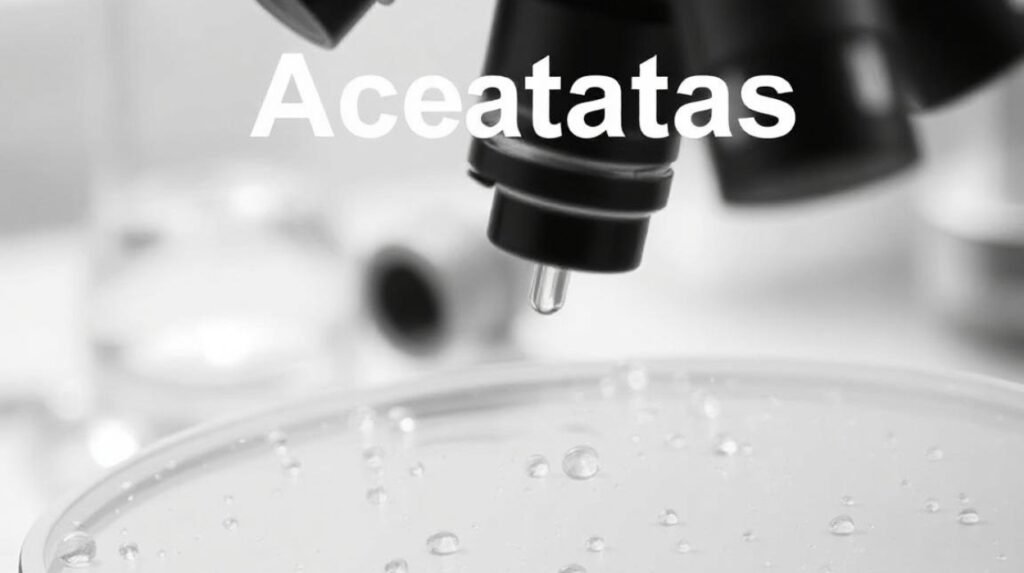Introduction to Acetatas
Acetatas, often referred to in scientific circles as acetate, is a versatile compound with a wide range of applications in industries such as pharmaceuticals, textiles, and food production. Acetate, which is the salt or ester form of acetic acid, plays a crucial role in many biochemical processes and is a key ingredient in various commercial products.
In this comprehensive guide, we will explore what acetatas is, its various uses, and its importance in different sectors. Whether you’re a student, a professional in the field, or someone with a general interest, this article will provide valuable insights into the world of acetatas.
What is Acetatas?
Acetatas is a term that refers to the salts or esters of acetic acid. In its most common form, acetate appears as a colorless liquid or solid that is soluble in water. It is widely used in various industrial and medical applications due to its chemical properties.
Chemically, acetatas can be represented by the formula CH3COO−, where CH3 represents the methyl group, and COO− represents the carboxylate group. This structure allows acetatas to participate in a wide range of chemical reactions, making it a valuable compound in multiple fields.
Common Types of Acetatas
There are several types of acetatas, each with unique properties and applications. Some of the most common types include:
1. Sodium Acetate (NaC2H3O2)
Sodium acetate is widely used in the textile industry for dyeing processes. It is also employed in heating pads and hand warmers due to its ability to release heat upon crystallization.
2. Calcium Acetate (C4H6CaO4)
Calcium acetate is often used in the food industry as a stabilizer and preservative. It is also found in pharmaceuticals for treating high blood phosphate levels in patients with kidney disease.
3. Potassium Acetate (C2H3KO2)
Potassium acetate is used in de-icing solutions for airport runways and as a food additive. It also plays a role in various laboratory applications.
4. Ethyl Acetate (C4H8O2)
Ethyl acetate is a commonly used solvent in the production of paints, coatings, and adhesives. It is also found in cosmetics and perfumes.
5. Zinc Acetate (C4H6O4Zn)
Zinc acetate is used in lozenges to treat the common cold and in dietary supplements to boost immune health.
Uses and Applications of Acetatas

Acetatas is an essential compound with a wide array of applications across different industries. Let’s explore some of the key uses:
1. Pharmaceuticals
Acetatas is extensively used in the pharmaceutical industry. For instance, calcium acetate is prescribed to patients with kidney disease to control phosphate levels in their blood. Zinc acetate, on the other hand, is a common ingredient in cold remedies and supplements.
2. Food Industry
Acetatas serves as a food additive and preservative. Sodium acetate is commonly used to enhance the flavor of snacks like potato chips. Calcium acetate acts as a stabilizer in food production, helping to maintain the texture and quality of products.
3. Textile Industry
In textile manufacturing, acetatas is used in dyeing and printing processes. Sodium acetate, in particular, is crucial for stabilizing the pH of dyes, ensuring consistent color results.
4. Cosmetics and Personal Care
Ethyl acetate is a vital ingredient in cosmetics and personal care products. It is used as a solvent in nail polish, perfumes, and lotions, allowing for smooth application and an even finish.
5. Industrial Applications
Acetatas plays a significant role in various industrial processes. For example, potassium acetate is used in de-icing solutions for airport runways, ensuring safety during winter operations. Ethyl acetate is also used in the production of adhesives, coatings, and paints.
6. Laboratory Uses
In research and development, acetatas compounds are used in buffer solutions, analytical chemistry, and various biochemical applications.
Health and Safety Considerations
While acetatas is widely used and generally safe when handled correctly, it is important to be aware of certain health and safety considerations:
1. Ingestion
Some forms of acetatas, such as zinc acetate and calcium acetate, are safe for consumption in prescribed doses. However, ingesting large amounts of other acetatas compounds, like ethyl acetate, can lead to nausea, vomiting, and other health issues.
2. Skin Contact
Direct contact with concentrated acetatas solutions can cause irritation or allergic reactions in some individuals. It is advisable to wear protective gloves when handling these compounds.
3. Inhalation
Inhaling acetatas vapors, particularly in industrial settings, can lead to respiratory irritation. Ensure proper ventilation and use appropriate protective equipment when working with volatile acetatas compounds.
4. Environmental Impact
While acetatas compounds are generally considered biodegradable, improper disposal can lead to environmental contamination. It is important to follow proper waste management protocols to minimize environmental impact.
FAQs About Acetatas
1. What is the difference between acetate and acetatas?
Acetate is the general term used to describe salts or esters of acetic acid, while acetatas is the Lithuanian and some other languages’ equivalent term for the same compounds.
2. Can acetatas be used in food products?
Yes, certain types of acetatas, like sodium acetate and calcium acetate, are approved for use in food products as preservatives and flavor enhancers.
3. Is acetatas safe for the environment?
Acetatas compounds are generally biodegradable, but improper disposal can still harm the environment. It is crucial to follow proper waste disposal guidelines to minimize impact.
4. How is acetatas used in the textile industry?
In the textile industry, acetatas is used in dyeing processes to stabilize the pH of dyes, ensuring consistent and vibrant colors.
5. What precautions should be taken when handling acetatas?
When handling acetatas, it is important to wear protective gloves and ensure proper ventilation. Avoid direct contact with skin and inhalation of vapors to prevent irritation and other health risks.
Conclusion
Acetatas is a versatile and essential compound with a wide range of applications across various industries. From pharmaceuticals to textiles and food production, acetatas plays a critical role in enhancing the quality and functionality of products. While it is generally safe when handled correctly, it is important to be aware of the potential health and environmental risks associated with improper use.
Whether you’re involved in research, manufacturing, or simply curious about the role of acetatas in everyday products, this comprehensive guide provides valuable insights into its importance and applications.
Read more on thehansindia.


